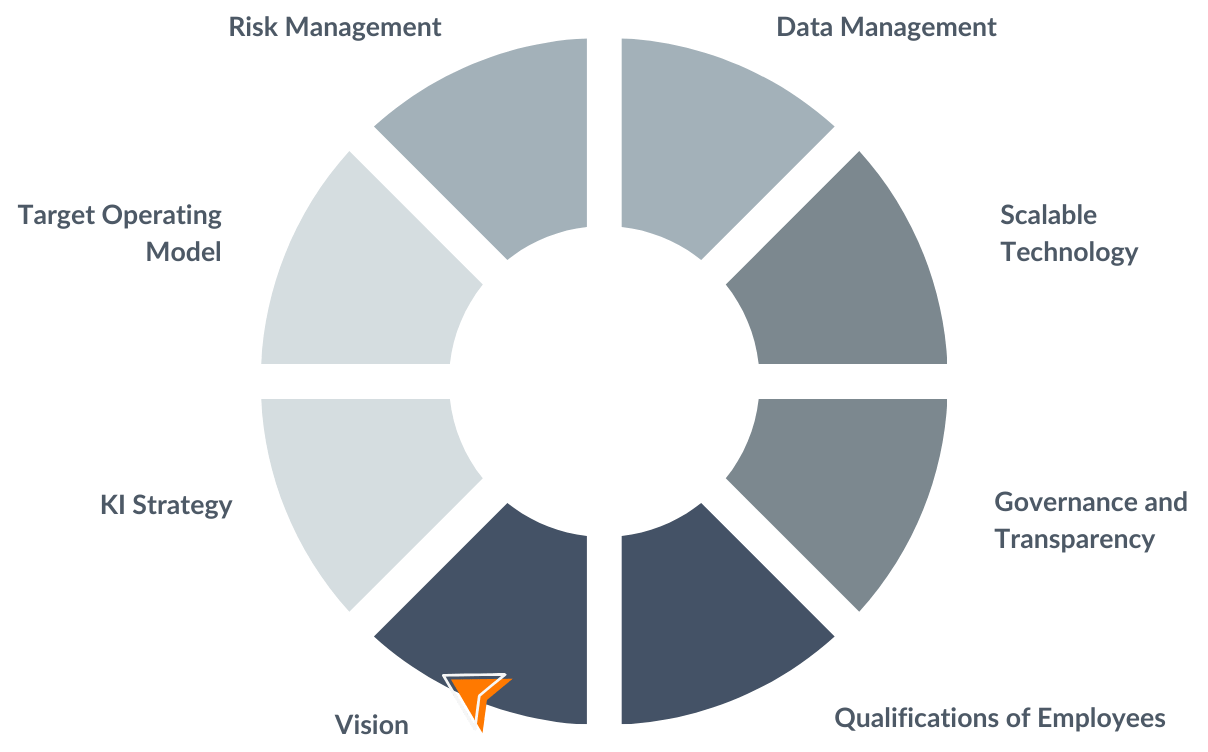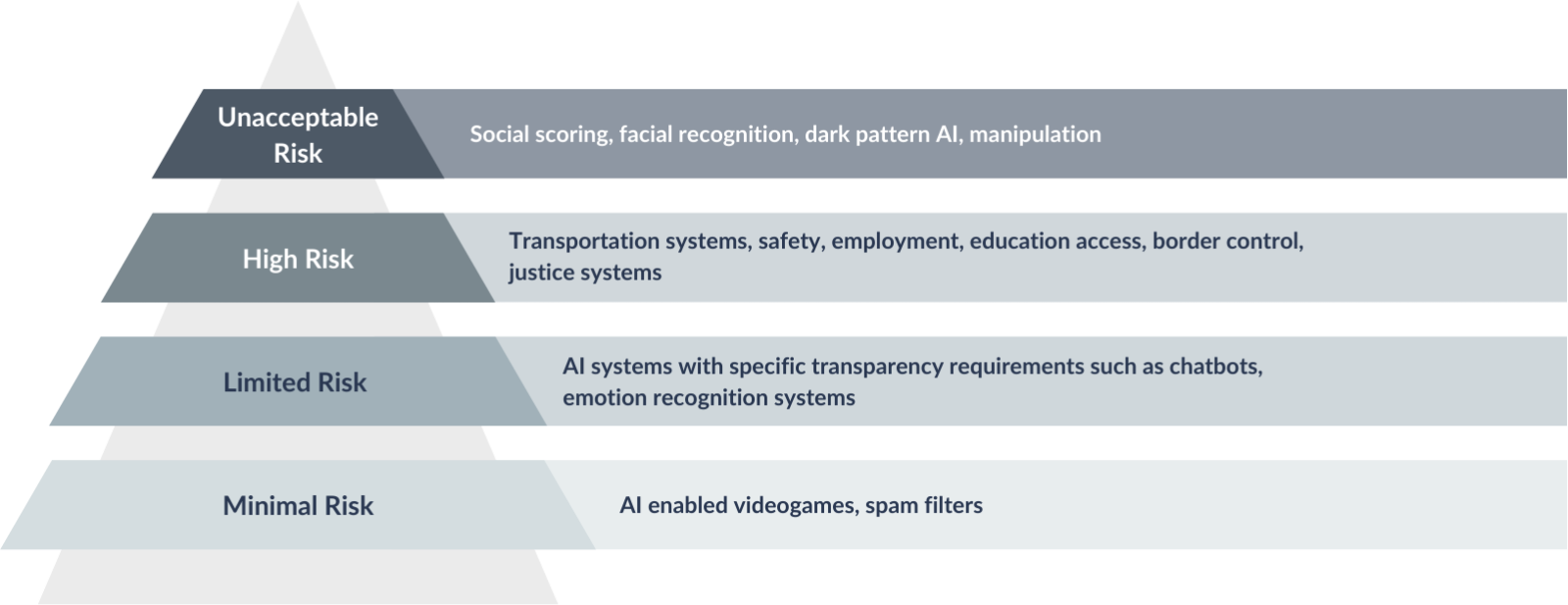Start Your Expedition
Artificial intelligence: Everyone is talking about AI, but what are the practical applications?
It is expected that the use of artificial intelligence (AI) will radically change the way companies operate in a relatively short period of time. Areas of application for AI include the automation of business processes or entire process chains. As well as the increasing use of data-driven decisions in corporate management, and the development of innovative business models based on the use of generative AI.
The introduction and integration of AI places high demands on every company. Both the service provision processes and the internal company processes, data infrastructure, and IT systems must be analyzed and adapted. It must be ensured that the IT infrastructure, and in particular IT security, are suitable for the use of AI applications. In addition, the corporate, IT, and data strategies must be specifically geared toward the use of AI in value creation processes. Furthermore, employee qualifications, ethical guidelines, and legal frameworks must be reviewed and adapted to ensure responsible and successful implementation.
|
What is Artificial Intelligence (AI)? "Artificial intelligence (AI) refers to the ability of machines to autonomously perform human-like cognitive functions such as learning, problem solving, decision making, and pattern recognition through the use of algorithms and data."
The key lies in not viewing AI as a means to an end, but rather as a tool that can be strategically incorporated into your own business model. Never losing sight of your company's philosophy, values, and DNA. |
Our approach: Making artificial intelligence strategic, implementable, and future-proof
We support companies in using AI in a targeted manner. Rather as a strategic tool for creating value than an isolated technology. Our approach is aimed at CxOs who want to create clarity, implement specific use cases, and lay the organizational foundations for AI deployment.
Our consulting approach comprises three key levers:
Flagship Projects & Implementation
To make AI tangible, we implement initial prototype solutions that are pragmatic, low-threshold, and controllable:
- Selection of suitable use cases with high visibility and impact
- Implementation with an experienced system integrator (cooperation partner)
- Design of a future-proof target architecture (data, infrastructure, applications)
- Control of implementation, including risk management and provider selection
Strategic Business Case & Roadmap
We evaluate the economic potential of AI across the entire company and create a strong basis for decision-making:
- Conveying a fundamental understanding of AI and its possible applications
- Identifying and prioritizing relevant use cases
- Evaluating existing data, application, and process landscapes
- Developing a company-specific AI roadmap with a business case and implementation path
Organizational Readiness & Business Model
We create the structural conditions for the long-term successful use of AI:
- Conducting a readiness assessment (e.g., via a workshop)
- Establishing governance, compliance, empowerment, and supplier management
- Developing a tailor-made target operating model: roles, processes, management, and responsibilities for professional AI operations
Our goal: to empower companies to use AI effectively and responsibly; with strategic clarity, operational feasibility, and organizational anchoring.
AI enables the automation of manual and repetitive tasks, the extraction of valuable information from massive data sets, and the generation of new perspectives or insights from structured and unstructured data. To succeed in this transformation, employees need to be empowered for new tasks.
This requires companies and their employees to acquire completely new skills, ranging from describing and evaluating requirements for AI use cases to developing and operating the infrastructure and effectively leveraging AI's capabilities.
A crucial aspect is also the proper handling of data, as its value is becoming more central. Companies must recognize this "data treasure," protect it, and use it strategically. AI can be a tool to mitigate demographic challenges, helping organizations retain the knowledge of experienced professionals who will soon leave the workforce.
The key to success lies in integrating AI strategically into the corporate strategy and existing operating models. Only with clear goals and a well-thought-out implementation can AI contribute to long-term growth and sustainability.
Implementing AI systems involves complex challenges that go beyond purely technological concerns. Companies must take a strategic and holistic approach to unlock AI's full potential sustainably. Four key challenges in leveraging AI as a genuine competitive factor are:
- Engaging and Empowering People:
The successful implementation of AI largely depends on how well employees are prepared for the new technologies. Simply providing AI systems is not enough-employees must learn to critically assess the results and use the tools effectively. It is crucial to avoid adopting either a passive or overly trusting attitude toward AI: AI-powered solutions are not a cure-all but require competent and reflective application. When introduced properly, AI can generate genuine enthusiasm, as employees can directly experience its benefits, such as increased efficiency, innovative problem-solving approaches, and new opportunities for personal and professional growth. - Ensuring Data Quality and Management:
The success of AI depends on the quality of the underlying data. Companies must identify suitable data sources and ensure they are current, relevant, objective, and unbiased. It is equally important to avoid training AI with faulty data, as this could lead to distorted results in the long term. - Integration into Existing System Architectures:I
Technical integration of AI solutions into existing systems and processes is often a challenge. AI applications must be seamlessly embedded within the existing infrastructure to fully harness their benefits. This requires stable interfaces that provide AI with current and relevant data and allow for smooth integration with surrounding systems. The right architecture is essential for ensuring long-term usability and making future adjustments easier. - Scaling into Operational Use:
Many companies start by testing AI applications in pilot projects or isolated environments. Transitioning these projects into the regular operating model is a complex task. Costs, efficiency, and risk management play a central role here. AI applications must be scaled in a way that ensures sustainable value creation without financially or organizationally overburdening operations. Clear metrics should be developed to measure the effectiveness and economic impact of AI applications.
Those who hesitate to embrace AI today will lose the competition tomorrow – we ensure that you shape the future, rather than chase after it.
Use Cases
The business case for AI
AI always becomes a successful business case when it turns large amounts of relevant data into real information, using this as a competitive advantage. Therefore, AI is increasingly becoming an integral part of corporate and functional strategies. It can develop the definition of objectives within the company to a new level. The aim is to use AI as an effective, future-proof tool for achieving objectives on the other.
Digitalization, automation, and artificial intelligence offer companies concrete approaches to ensuring the long-term and sustainable future viability and competitiveness of their business model.
Where does AI excel?
- Quick access to large amounts of information
- Extracting relevant information in a successive process
- Summarizing information from many sources (with and without source references)
- Converting information from speech to text, and from one language to another
- Recognizing patterns and probable consequences
What levers can AI use?
- Processes with (searchable) access to a lot of information (e.g., services with lots of instructions, lawyers with legal texts, contextual Internet searches, etc.)
- Translation of spoken language (chatbots, advertising films, customer inquiries, protocols) and modulation of language
- Translation of texts (e.g., mail)
- Creation of texts (e.g., advertising copy, presentations)
- Application of logical languages (programming, debugging, etc.)
- Learning-based development of rules for processing (invoice analysis for accounting or bank transfers)
- Structuring texts for decision-making processes (e.g., analysis of emails and inquiries)
- Statistical models of pattern recognition (e.g., fraud detection, manipulation of images and graphics)
- Statistical models of prediction for the future (e.g., logistics, buyer behavior, scoring, machine failure)
Deep Dive: Technology
“Don't waste too much time on strategy papers. Put generative AI into practice.”
Many companies hesitate to implement AI initiatives – not because of a lack of ambition, but because of a lack of clarity in strategy, use cases, or integration. We help overcome precisely these hurdles: with a clear focus on business value and an experienced technology partner at our side. While we bring the business perspective, our partner takes care of the technical implementation – efficiently, integrated, and practically:
Our contribution: Business clarity & strategic focus
We help companies clarify relevant questions:
- Which specific use cases create real added value?
- How can business processes be intelligently automated?
- What roles, governance structures, and operating models are needed to achieve this?
Our partner: Technological enablement & implementation
Our cooperation partner contributes technological excellence:
- Integration into existing IT architectures and data
- Use of the latest models and platforms
- Ensuring data protection, security, and compliance
- Development and scaling of individual AI agents
The concept: Hyper-agents – individual AI applications with impact
At the core are so-called hyper-agents – AI-based solutions that take on specific tasks, accelerate processes, and support decision-making. They are:
- Company-specific: Tailored to individual requirements and data
- Quick to deploy: Development and integration in just a few weeks
- Fully integrated: Work seamlessly within existing systems
- Secure & compliant: GDPR-ready, auditable, with built-in governance
- Secure & compliant: GDPR-ready, auditable, with built-in governance
- Scalable & adaptive: Continuously improvable and expandable
We accompany you every step of the way, from opportunity assessment to scoping and development to the rollout of the agent.
Our common goal: Not just automation, but concrete transformation. With clearly identified use cases, customized technology, and a pragmatic, secure implementation approach.

Your CIO-Expert
Martin Stephany
Partner
Deep Dive: AI in Finance
AI in the financial sector: Strategic added value for CFOs
The use of artificial intelligence in the financial sector has the potential not only to make key processes more efficient, but also to improve their quality and enable more informed decisions. For CFOs, this means less operational burden, higher data quality, and more time for strategic management.
Typical areas of application in the financial sector include:
- Fraud prevention and detection: AI-based models identify anomalies in transaction data and support the early detection of potential fraud cases – even in large data volumes and in real time.
- Automated reporting: The use of natural language processing enables reports, analyses, and comments to be generated automatically and consistently – efficiently, comprehensibly, and in a standardized manner.
- Intelligent data processing: AI takes over the automatic classification and processing of bookings, receipts, and transactions—with clear efficiency gains and higher data integrity.
Well-founded evaluation with the 4C AI Evaluation Model
Not every use case is suitable for AI. That's why we work with our customers to evaluate each use case along six dimensions:
Technology
How mature is the underlying technology? Is the use of AI to solve the problem technically feasible and realistic?
Problem-Solution Fit
To what extent does the potential use case address a specific problem within the company? How well does AI fit as a solution, also in terms of existing systems and processes?
Business model
What quantitative or qualitative efficiency gains can be expected? Is a positive business case foreseeable? Is there potential for new revenue models or services?
AI skills, including maintenance and support
Does the organization have the necessary resources to operate and further develop the AI model in the long term? Or do skills need to be built up in a targeted manner?
Training data
Is the relevant data available in the required quality, depth, and structure? What are the costs involved in data preparation, enrichment, or integration?
Governance & Ethics
Is the use case designed in an ethically and regulatorily responsible manner? Are the relevant guidelines being followed—for example, with regard to data protection, fairness, or transparency?
A standardized assessment is carried out for each dimension using a detailed questionnaire. The individual criteria can be weighted to take into account company-specific priorities, such as technological feasibility, regulatory requirements, or business impact. The result is a differentiated, comprehensible assessment for each use case.
Goal: Combining strategic management with technology
With our structured approach, we support CFOs in leveraging the potential of AI in a targeted manner—based on reliable data, clear decision-making logic, and practical implementation. The focus is on:
- Increasing efficiency and reducing costs
- Improving the quality of data and processes
- Minimizing risk through automated testing and control mechanisms
- Transparent decision-making through sound evaluation
Would you like to strategically tap into the potential of AI in your finance organization?
We support you from the identification of relevant use cases to successful piloting – with sound methodology, industry knowledge, and technological expertise.

Your CFO-Expert
Markus Noçon
Senior Partner
Deep Dive: AI in HR
We are your HR partner in the age of artificial intelligence
The world of work is changing rapidly; AI will affect up to 40 percent of jobs in the coming years, especially in knowledge-intensive areas. For CHROs, this means that HR must evolve from a pure service center to a strategic driver of digital transformation. Those who ignore AI risk losing relevance. Those who actively shape it position HR as an indispensable partner to management.
The following use cases are conceivable:
Workforce Planning
- Fluctuation forecasts
- Skills-Gap-Analysis
- Strategic Workforce Planning / Succession Planning
Recruiting & Onboarding
- CV-Screening & Matching
- AI chatbot for applicants
- Automated onboarding checklists
Performance & Compensation
- Real-time feedback analysis
- Fair Pay Analyses
Talent Development
- Personalized learning paths
- Succession planning
- Mentor Matching
We support CHROs in developing and implementing a sustainable HR AI strategy. Employees use AI anyway, often without permission, that's why it is important to create a safe space for its responsible use. We accompany the entire process from strategy development to change management and process design. For the technical implementation, we work closely with experienced partners to ensure a seamless and secure offering.
Our consulting approach includes:
- Analysis and prioritization of AI use cases with real added value for HR and the company
- Building AI literacy and change management to reduce fears and create acceptance
- Development of governance and security concepts
- Design of feedback and monitoring systems for continuous improvement and bias avoidance
- Support in redesigning HR processes so that AI can unfold its full potential
- In close cooperation with our technology partner: Provision of scalable, data protection-compliant AI solutions for HR; from demo versions and SaaS offerings to individually integrated enterprise solutions that can be flexibly adapted to company size and requirements
Successful AI transformation in HR does not begin with technology, but with people and processes. Only those who consistently rethink workflows and understand change management as an integral part of the process can leverage the full potential of AI in a sustainable manner.
With our CHRO Advisory service, we prepare HR for the AI-driven future. As a strategic partner that helps shape the future rather than merely reacting to it. This ensures your company's competitiveness and boosts employee satisfaction and development.

Your CHRO-Expert
Heiko Mauterer
Senior Partner
There are numerous other examples of how companies can profitably implement AI. Here are some specific applications:
Success Factors

Success Factors for AI Implementation
To successfully implement AI within a company, several factors must be considered:
- Vision: The long-term vision defines the company's desired future state in the context of AI implementation. It outlines how AI will be strategically used to gain competitive advantages, drive innovation, and achieve business objectives.
- AI Strategy: Derived from the vision, the AI strategy details the specific path to achieving these goals. It includes clear milestones, investment decisions, technology roadmaps, as well as organizational and structural adjustments.
- Target Operating Model: A target operating model specifically designed for AI ensures seamless integration into existing business processes and optimizes the use of technology.
- Risk Management: Comprehensive risk management covers all aspects of data, methods, know-how, and outcomes to ensure the integrity and reliability of AI systems.
- Data Management: High-quality, up-to-date, and secure data are the foundation for effective AI applications.
- Scalable Technology: Companies need scalable IT infrastructure to efficiently operate AI solutions.
- Governance and Transparency: Building trust in AI systems requires transparent processes, strict process discipline, and clear ethical guidelines.
- Employee Qualification: Training and continuous development of employees in handling AI technologies are crucial success factors.
Regulation & Governance
The growing prevalence of AI technologies requires clear guidelines to ensure their use is safe, transparent, and responsible. These guidelines provide the necessary framework to align technological innovations with legal requirements, ethical standards, and societal expectations. With the EU AI Act, the European Union has developed a comprehensive regulatory framework that aims to ensure the transparency, safety, and reliability of AI applications while promoting innovation.

EU AI Act
When implementing an AI strategy, it is essential to ensure compliance with the EU AI Act. This legislation sets the legal framework for AI use in Europe and distinguishes between various risk categories (see graphic). Exploratory, professional, and data-sensitive applications are subject to specific regulatory requirements. Companies must demonstrate that their AI systems are either risk-free or adequately protected-particularly when dealing with personal data or technologies that could be misused, such as in the field of weapons technology.
The EU AI Act presents new challenges but also opportunities. It provides a clear framework for the responsible use of AI and strengthens trust-especially in sensitive areas like healthcare or public administration. Companies that meet these requirements can fully leverage the benefits of AI transformation and secure their competitiveness in the global market.
New Regulations for the Use of Artificial Intelligence
As of February 2, 2025, binding regulations for the use of Artificial Intelligence (AI) apply across the European Union.
Read More …Why 4C?
We accompany your AI transformation
4C offers a holistic approach to AI projects that combines strategy, management, and transformation. Instead of standardized solutions, we focus on developing customized, flexible AI solutions that are scalable and adaptable in the long term.
Analysis and understanding
- Evaluation and prioritization of use cases through a structured approach.
- Understanding of digital business models and the resulting importance of data.
- Understanding of decision-making processes and the role of data as a basis for decision-making.
Process optimization and digitization
- Preparation of processes based on concentrated analysis and best practices.
- Identification, evaluation, and implementation of digitization potential.
Transformation and Change Management
- Experience in change processes for automation and reorganisation through the targeted use of AI.
- Assessment of the impact of software implementation through experience in governance, risk management and compliance.
Entrepreneurial action and strong partnerships
- Entrepreneurial perspective: Understanding the impact of decisions on the business.
- Strong technology partners: Working with reliable partners for successful implementation.
With our many years of expertise, we help you to fully exploit the opportunities offered by artificial intelligence and make your organization future-proof.
Trust in our practical approach and our in-depth specialist knowledge—together, we will shape the future of your company.
Insights
4C Whitepaper: Artificial Intelligence (AI) for HR
How Artificial Intelligence is shaping the future of human resources and is already being implemented in leading companies today - explore exciting use cases in action.
4C Whitepaper: "Digital Finance"
Download our Whitepaper to learn how digitalization is driving the transformation of financial processes and roles, making strategic realignment and data-driven decision-making essential.
4C Study: Collaboration of Innovation Departments
Collaboration with Münster University of Applied Sciences on the following research question: How can a balance be achieved between the freedom and creativity of innovation departments and successful collaboration with specialist departments from the core business?
Thank you for understanding that we can currently only offer our studies in german. For more information feel free to contact us directly.
Your Temporary Co-drivers
Please do not hesitate to contact us to learn more about the sustainable use of AI for efficiency, added value of information, and decision-making confidence as a real competitive factor. Together, we can successfully shape the future of your company.
Wir begleiten Sie auf Ihrer Transformation.
Kontaktieren Sie uns jetzt!
Contact us
Please note that this website only provides a limited insight into our services. Our expertise and range of services cannot be fully represented on this platform. For individual advice and to address your specific concerns in the best possible way, we invite you to contact us directly so that we can offer you tailor-made solutions.
Thank you for your trust. We look forward to hearing from you.








